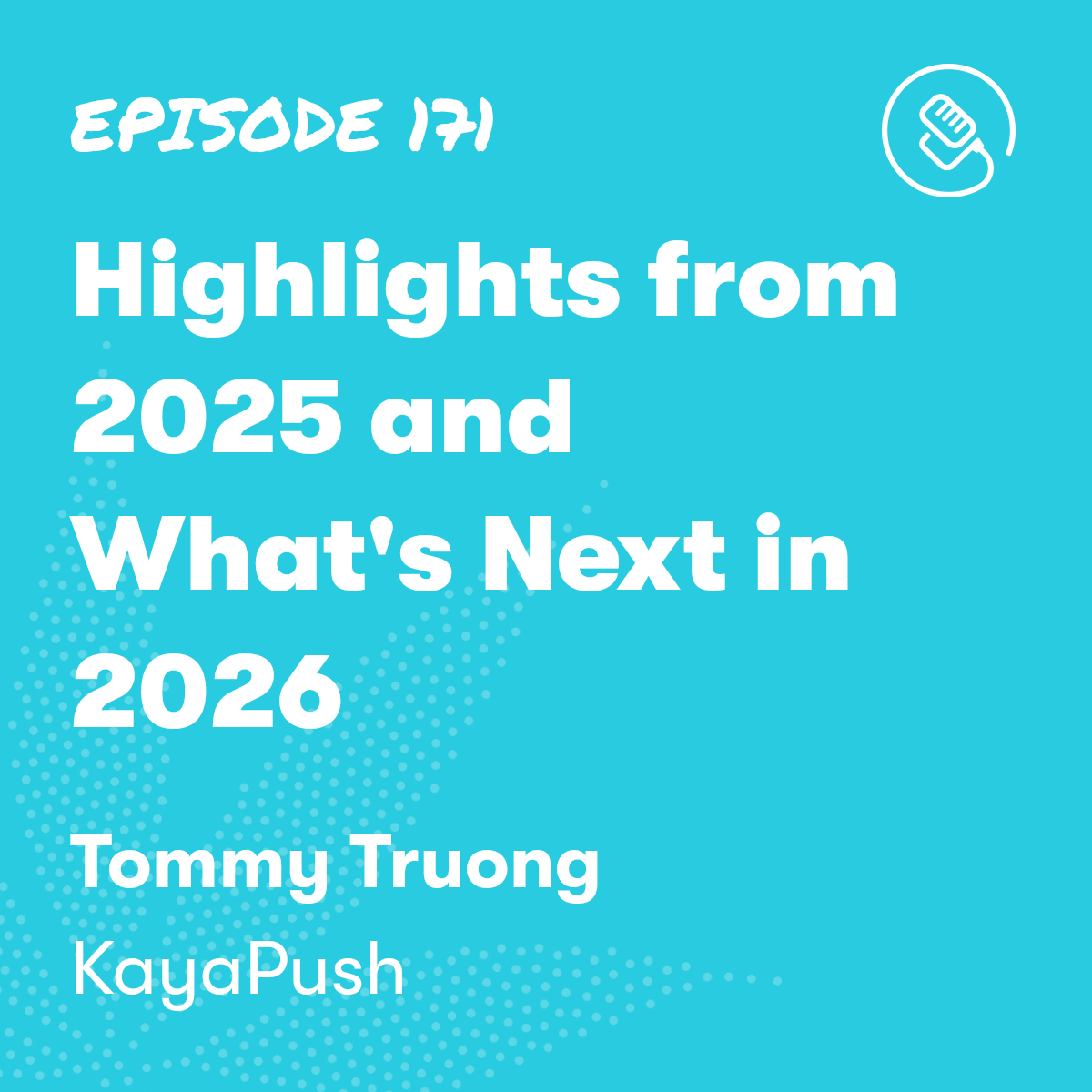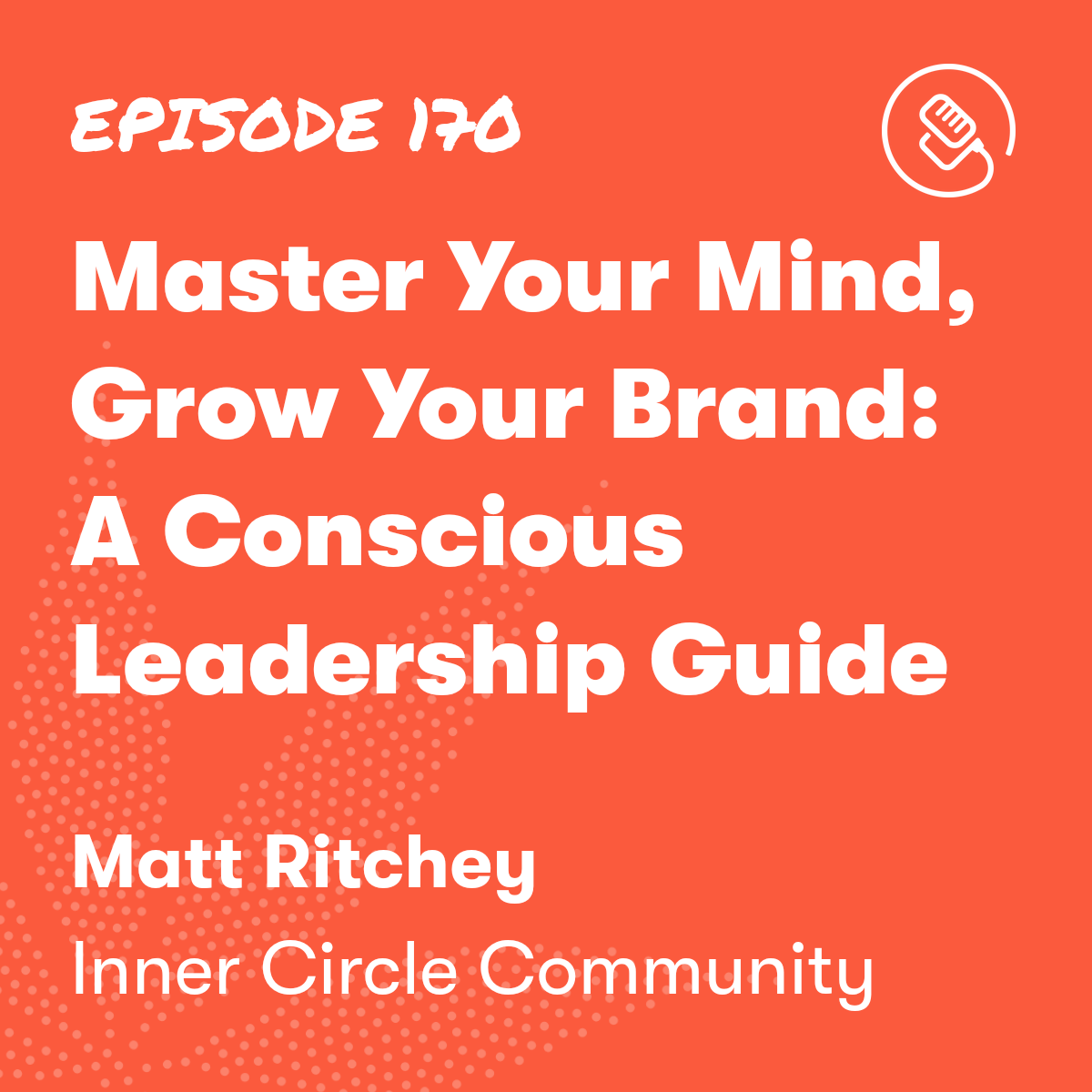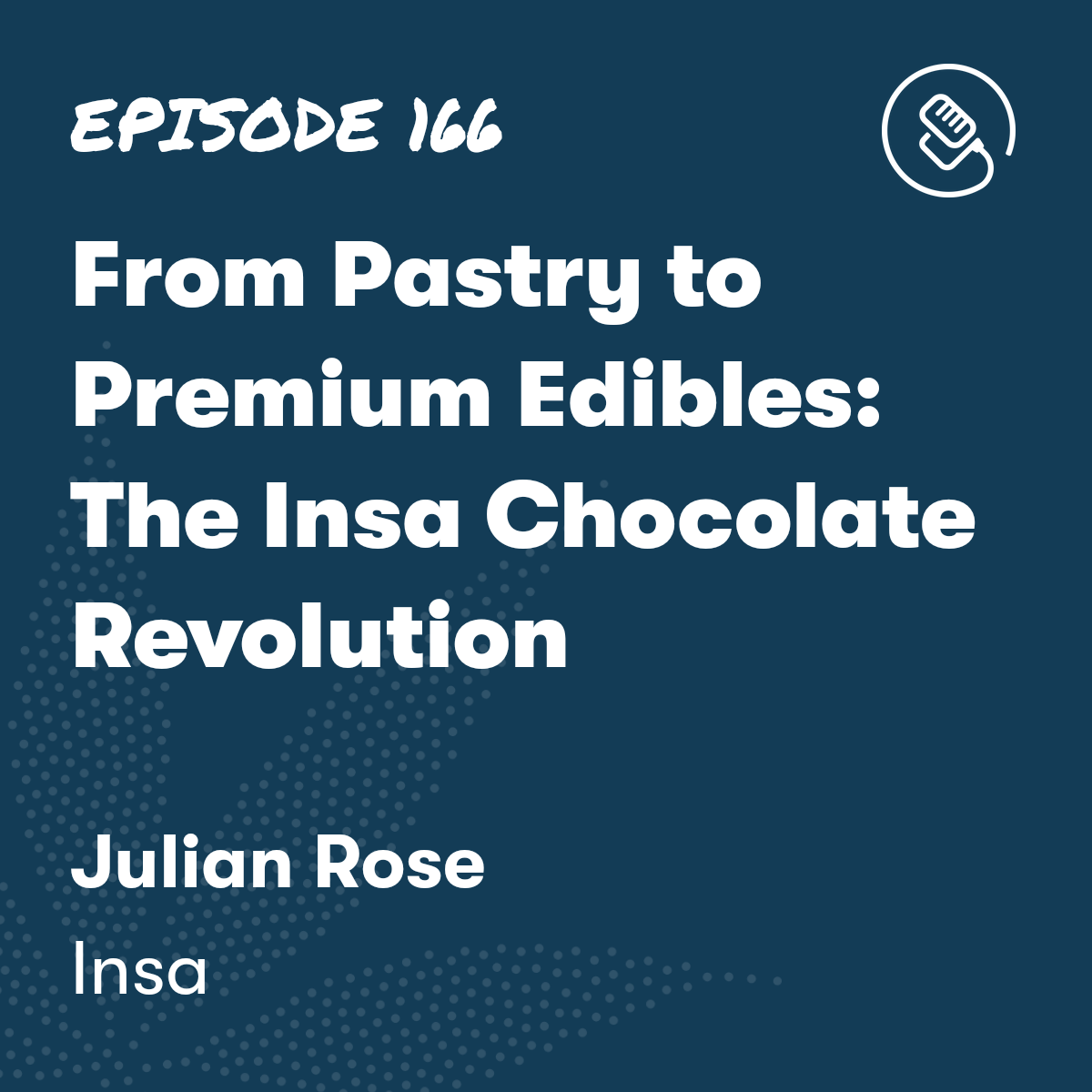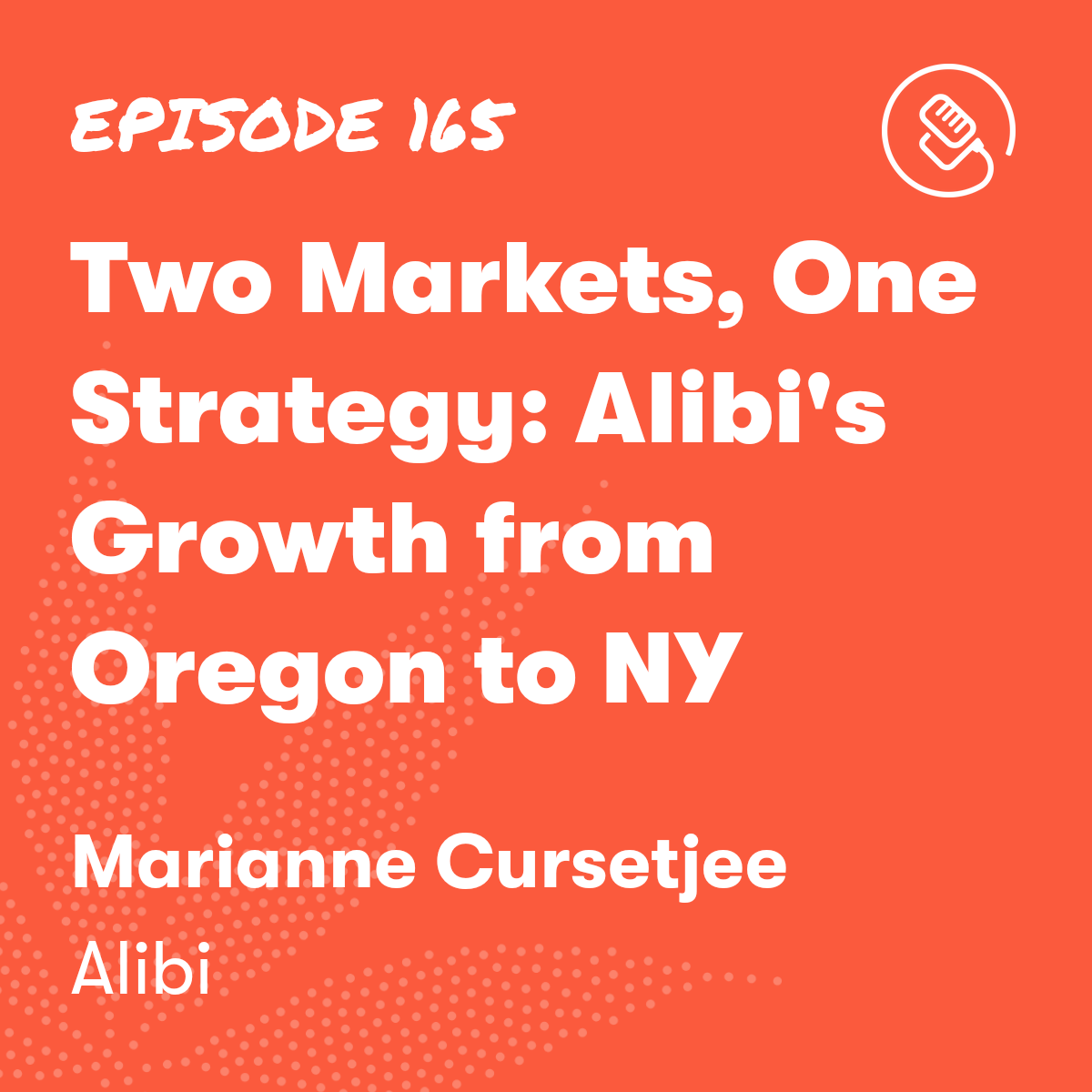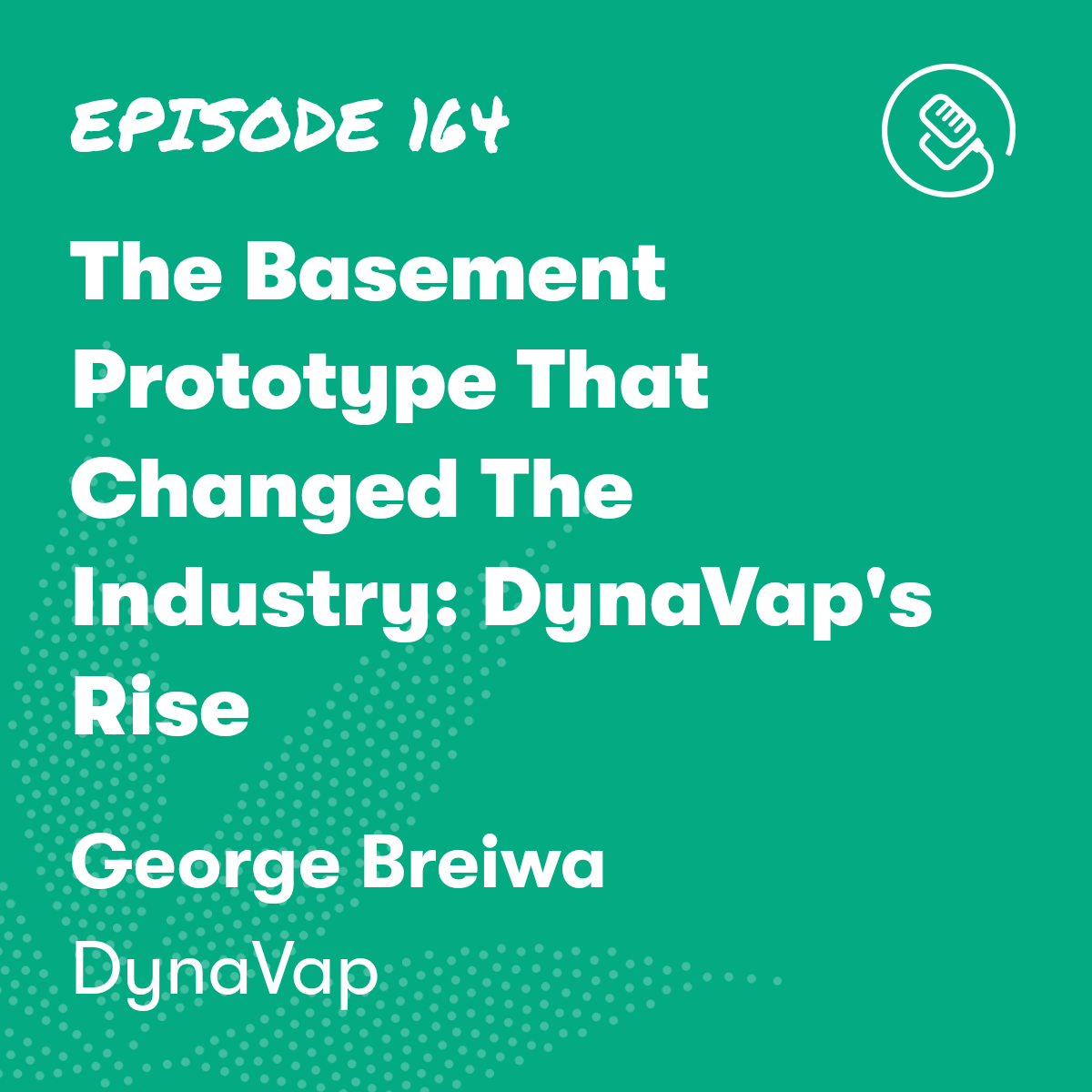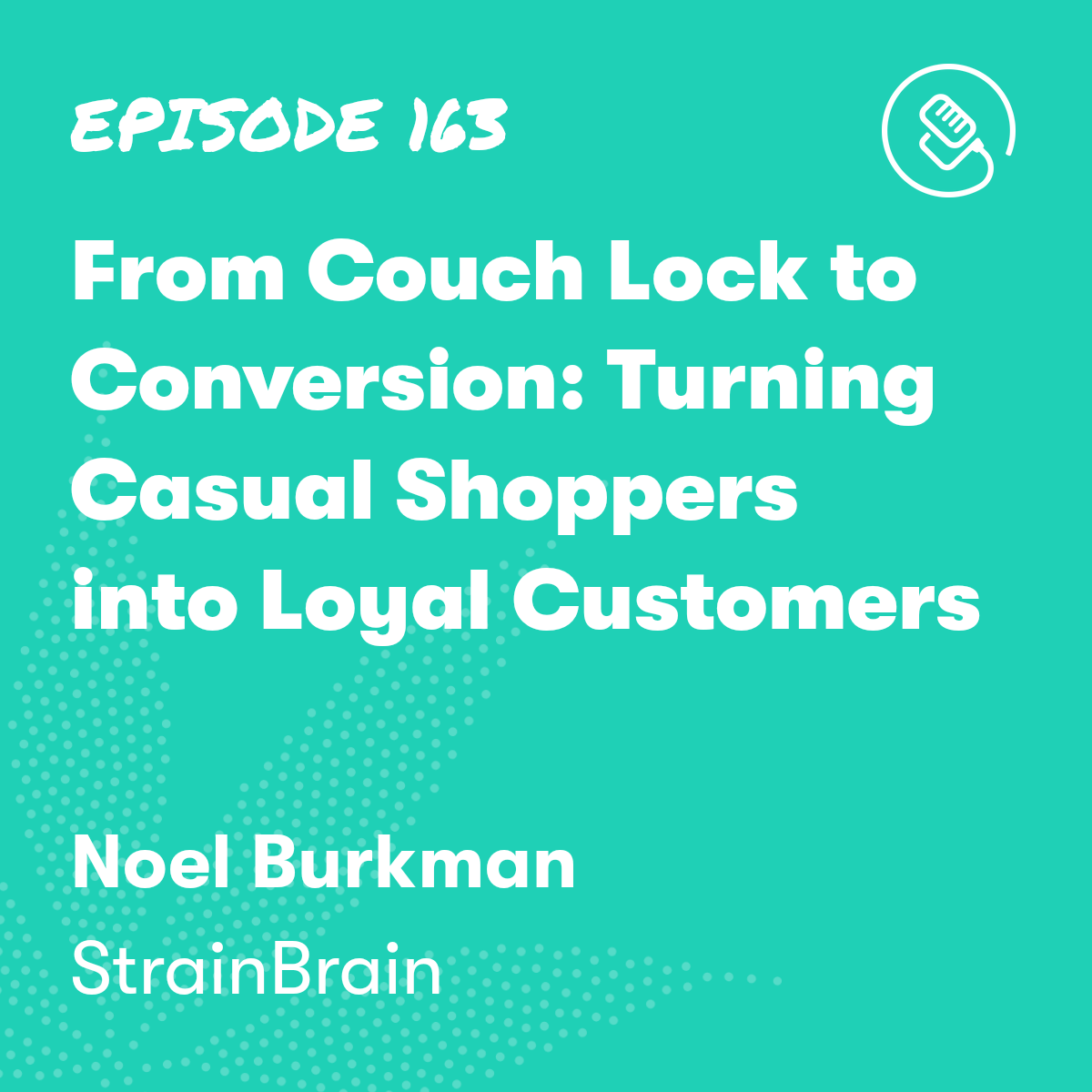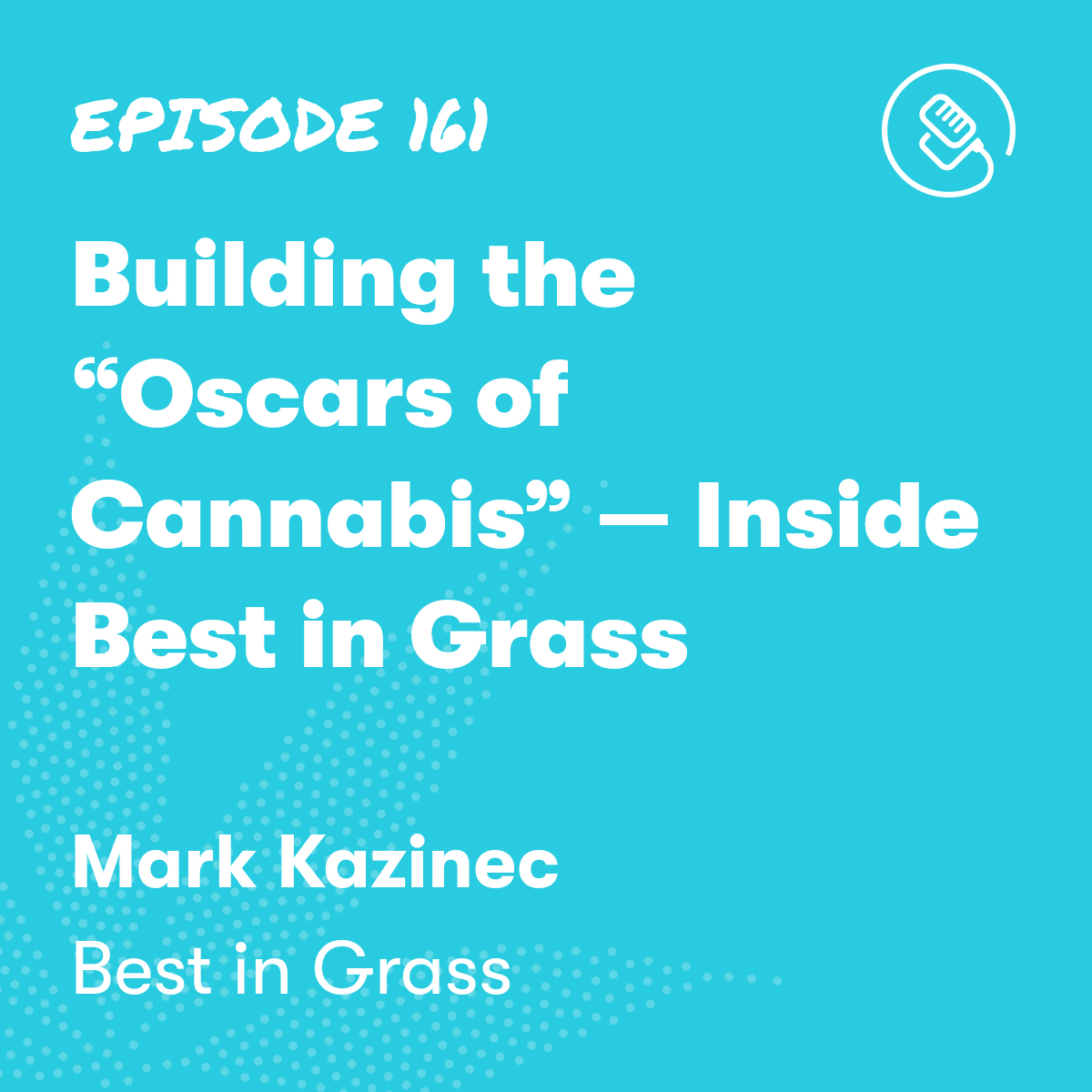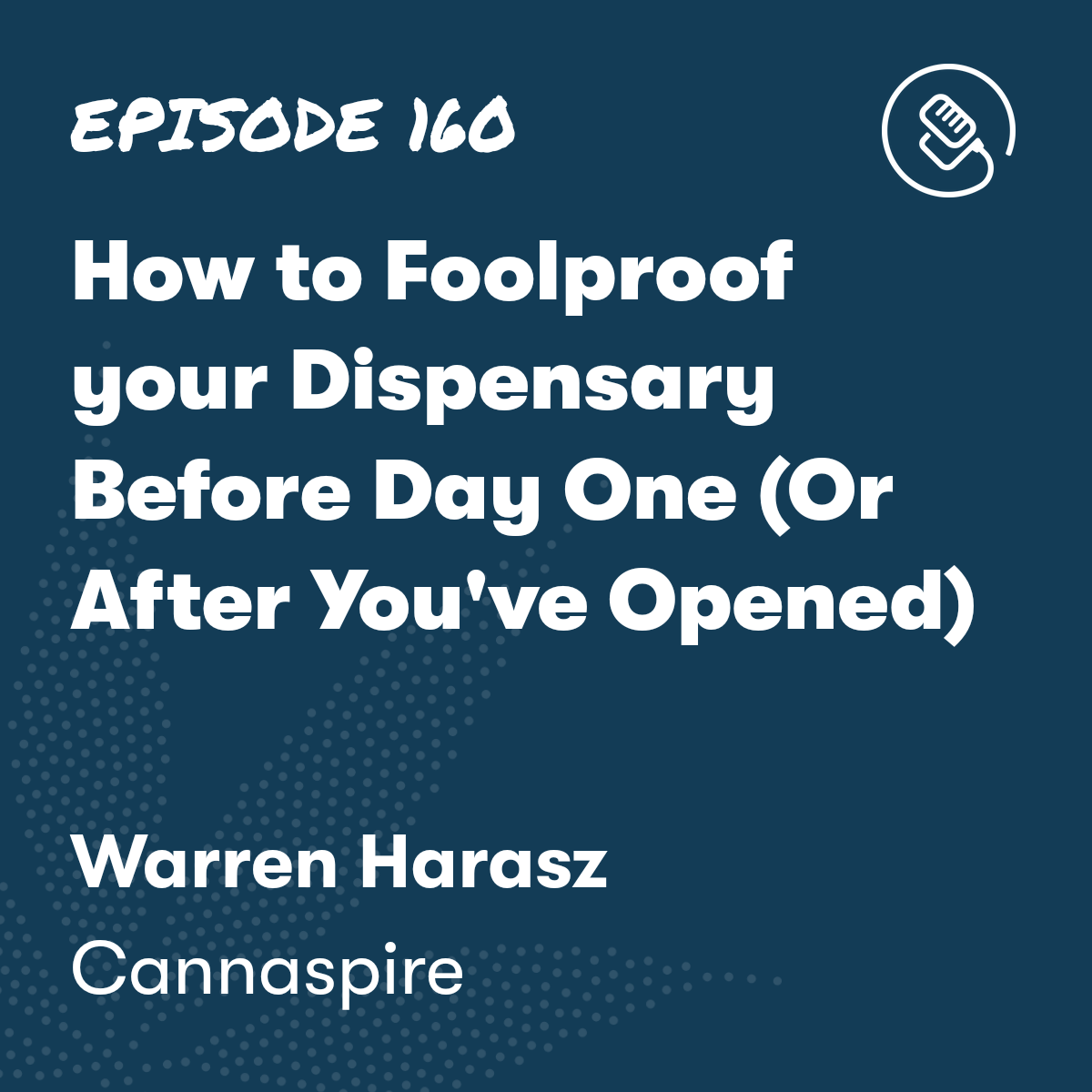

Terpenes Over THC: A New Era for Dispensaries
Episode Description

Episode Transcript
Tommy Truong: [00:00:00] We had a conversation a couple weeks ago about your history with the plant, and I feel like not a lot of people truly understand why you got in to cannabis. Can you share a little bit about your history with cannabis?
Nikki Lawley: Sure. I'm a dare graduate from the Nancy Reagan era here in New York. And cannabis was never considered medicine. I am a former pediatric nurse, and I discovered the plant by accident after I suffered a life-changing work injury. While working as a pediatric nurse, a child became combative for a vaccine, just a routine shot, and my life changed in less than a second.
He ended up hitting me in the head. I bounced off a wall and back into his head. And life as I knew it was over. I literally didn't recognize who I was in the mirror anymore because I had [00:01:00] such a profound change in my cognitive abilities. My chronic pain. I didn't even know what that was. Even being a nurse until it really happens to you, Tommy, it's really difficult to understand.
And even as a compassionate caregiver and everything, I could not relate to those people that said they were always in pain. I just couldn't like, I'm like, how can you even live if you're in that much pain? I live with it now, and I understand that, and cannabis became a vehicle for me to get off 16 different pharmaceuticals that each one had more horrific effects than the previous one, and I became hyper allergic.
To all kinds of different substances, including prescription pills. And I would go into anaphylaxis on a very regular basis, and that is some really next level scary stuff. [00:02:00] And I just was feeling totally hopeless. Like there was no hope left for me. My husband, in a desperate effort to try and cheer me up, ended up sending us to Las Vegas.
I'm a former casino dealer, so Vegas was always my place to go unwind. Have a good time on this particular vacation. There was no vacation about it. I was in way too much pain. I couldn't handle any kind of overstimulation and my life had become one of living in the corner in dark rooms and just trying to sleep, do anything I could take the, all these pills I've had, had it.
And I ended up. Going out on my balcony on the Cosmopolitan Hotel in Vegas and getting ready to take my life. I look down the pool areas, three stories below. I'm like, oh, that's perfect. You can't even kill yourself, right? You're just gonna screw yourself up more. And then I look out on the [00:03:00] strip, and as I look out a mobile billboard comes cruising by advertising.
Get your medical marijuana card in Nevada today.
And that was profound, but then it came back a second time after going through this Nancy Reagan era, my son having been arrested for a felony for growing cannabis. I was not necessarily rah rah, cannabis is gonna help you with a brain injury. I had the diagnosis of. Chronic pain, traumatic brain injury, and anxiety and depression.
Well, in my mind, the first thing I saw was Nancy and the egg in the frying pan saying, your brain on drugs. And all I could think of is, my brain's already on drugs, how much worse can it be? So I mentioned to my husband and there began my medical journey with cannabis.
Tommy Truong: What was your first experience with [00:04:00] cannabis?
Nikki Lawley: Well the, now I had had cannabis at like social gatherings and things like that. But from a medical perspective in Nevada, my first experience was a guy gave me a bunch of edibles, like six different packs and five or six, I don't remember exactly, but when he did, there was no like dosage instructions or just take half or just take one.
And in Nevada, I believe the pack size was 200 milligrams per package for medical patients. So hypothetically, I ate all of them in a matter of like 45 minutes.
Tommy Truong: So you a thousand milligrams.
Nikki Lawley: Easily. Yeah. At least. Yes. And I slept so hard for like 18 hours and previously the most I got was three hours. And that was like stretching it.
I was just uncomfortable all the time. So my husband woke me [00:05:00] up and like, he's like, are you alive? like I have not moved that long since pre-injury. So it was really. Kind of transformative. And I woke up, hung over. I mean, I felt like I had just been hit by a truck with that many milligrams in me, and we had two joints that I had purchased and he's like, we're going home later today.
You need to make sure that you smoke those. We can't take 'em home with us on the plane. And I'm like, yeah, yeah, yeah, but I can't smoke right now. I just feel like shit. And he was insistent. So I go outside, I light one of these up, and I mean, it was just brain fog as sour. And I don't remember the strain. I don't remember what was in it or anything like that.
But I can tell you that joint got me up and moving. It made me want to go downstairs for the first time in that vacation and [00:06:00] go get something to eat. I mean, was I ready to go gamble and hit the tables? Absolutely not. But. This was progress. This was huge, gigantic progress. So I came home to Buffalo thinking that I could get a medical card just like I did in Nevada.
Super easy. We had cannabis in New York, and at the end of the day, it was not easy. I did not have one of the qualifying conditions that allowed you to qualify for medical cannabis. So
Tommy Truong: You outta all people.
Nikki Lawley: well, we only had five and they literally were death diagnosis, like wasting syndrome aids, stage four cancer.
I mean, they were so severe, like you couldn't, suicide was not part of it. PTSD was not part of it. Any kind of mental health diagnosis, not part of those qualifying conditions. So I shared with my physicians [00:07:00] that, you know, I had tried cannabis at, I was. Ostracized. I was literally, as a medical professional who is coming, like I'm still the same nurse that had that training.
I'm still the same nurse that was a colleague, was a coworker, and now I'm regarded as some drug seeker. And it's put in my medical file that I'm a drug seeker that don't give her narcotics because she just wants to get high and that's not a diagnosis. That one really wants to follow them for the rest of their life.
And I was mortified, like just mortified, like a drug abuser. when I saw that on my chart, I was like, oh my God, they've got someone else's diagnosis in my chart. Like I'm the last person I would call a drug seeker. And yeah, so I am a 100% [00:08:00] believer in the plan because. After that experience and after all these doctors just literally checked me off as a, you know, druggie and someone that is just trying to get high.
I set out to kind of change that perception because I didn't understand cannabis was medicine. If you would've told me your child was using cannabis for seizures, I would've called Child Protective Services on you. It would not have been a discussion. It would've just been a known like, you can't give your kid weed.
Now, I'm 100% for cannabis for children. So just people need to kind of open their mind more and until it happened to me, I didn't have an open mind. So it's really true that you can't judge someone unless you've walked in their shoes.
Tommy Truong: Wow. So it, [00:09:00] your relationship with the plant was a complete 180. Really? And it happened by accident. How did you become the terpene lady?
Nikki Lawley: Well, honestly, Tommy, I became a medical cannabis refugee in Canada, and while I was in Canada, I discovered it was a mobile app, and it was based on certificates of analysis or test reports from each of the cultivators in Canada. So I began to learn that it wasn't indica, sativa, or hybrid that had the effects.
It was more the individual terpenes and their medicinal properties. I like to think of terpenes, almost like essential oils because. They smell, they have medical effects, essential oils do as well. So [00:10:00] using that analogy, it kind of helps people understand that this is where the health benefits come in.
It's really not just hocus pocus. And this app with strain print allowed me to kind of narrow in what symptoms I was using cannabis for, because that's the first thing you gotta figure out, why do I wanna use the plant? What is the feeling or symptom that I'm looking to relieve right now? And I mean, that could change every day.
That could change three times a day. So as I mentioned earlier, chronic pain, anxiety, depression, and cognitive function are my three big ones. So I began to experiment with different strains. I. Utilized thousands of strains at this point in my journey. And learning what works is a true art. And again, this app was incredibly helpful in guiding me to learn what that consistency was.
If you don't [00:11:00] journal your experience, it is so hard to know what works, because Blue Dream from, you know, LP one to LP 10 is totally different VAR profiles, and that test report is gonna be different. For instance, here in New York, we have a brand, it's called Bread and Thumb Industries, and they make a product called lge.
LGE is an amazing cultivator for my cognitive function. I literally seek this out. They literally can't make enough for me. I buy 10, 20 packs of these pre-rolls at a time. Because it works so well for me. I like to say it connects my dots. That's why I'm always in polka dots in a red blazer side note. And the Lauren just came out.
And when I tell you, Tommy, it's different. It is different. It's still the same Terps, but that TERP percentage is totally [00:12:00] different. And so the effects are totally not the same. The taste is not the same. And I mean, I did a research study on this strain, so I'm pretty familiar with it.
And I don't think there's many experts to the point that I am, just because it's done so many great things for me, and I am hoping the next batch is better. You know, like these were the small buds first. So I'm hoping that the larger premium buds come out the way I'm used to, but. Again, it's based on a test report.
Tommy Truong: So you, out of necessity, because you were dealing with really hard migraines every day and you found that cannabis helped you were now pursuing, okay, what is the best strain for me?
Nikki Lawley: Mm-hmm. In.
Tommy Truong: terpene profiles.
Nikki Lawley: In California, in Las Vegas and then it came to New [00:13:00] York and consistent all the way through in different states, which Green Thumb is a multi-state operator. So obviously it's the same genetic, but different climates yield different results too. So again, the last batch of Lauren and this batch of Lauren are just different.
It's definitely different.
Tommy Truong: Wow. So you've tried thousands of
Nikki Lawley: Thousands.
Tommy Truong: so is that, and every time you try it, you journaled. is that how you built up your knowledge of terpene profiles? The impacts personally as well as documented?
Nikki Lawley: So truthfully, I no longer am journaling. The Strain print app doesn't work in the States. So you know, there's not that data set that matters. But I do still look at COAs and I do look at the dominant terpenes, and I guess I'm not as science [00:14:00] focused, driven because I haven't found another strain like Lauren, you know, I haven't found one exactly the same.
So how does, if I was a dispensary owner and I have a team of salespeople, bud Tenderers, how does teaching them the foundation of cannabis terpenes, improve sales in any way?
by asking the right questions you can help guide your customer to the experience they're really looking for. So just asking a few even, you know, are you using cannabis for effects or to help symptom relief for something that's bothering you, like you can't sleep, or you know, I'm not asking them to be.
Medical providers here, but you know, by asking a few questions, you can really help tailor that experience because everyone has different needs and everyone is affected differently. I think [00:15:00] when we were talking last time, I sent you to the dispensary seeking.
Tommy Truong: Yeah, and I wanted to talk about that. so I am a flower person, and I'm coming to you, you are a sales associate, and let's role play. So what are the questions that you're asking me as a sales associate?
Nikki Lawley: So Tommy, what brings you in today?
Tommy Truong: I'm a daytime smoker, so I don't really like to get really high. I smoke to either clean, work out, or think about a problem in a different light in a different angle.
I don't want to come down with a huge hangover. I wanna be normal after my experience with cannabis.
Nikki Lawley: Cool. So. Just some of the things I pulled out of that is you're looking for something for focus, something that's kind of motivating, but something that doesn't make you wicked high to where you're blazed and you just wanna go sit in front of the TV and chill out.
You're looking for a functional [00:16:00] strain.
Tommy Truong: Yes.
Nikki Lawley: So I would focus on something that has liming. And what liming is, is that's that citrusy flare. So if I squirt a lemon in your face, you're immediately gonna feel energized. You're gonna be like, woo. Well, that's kind of what liming does with flower. And one of the things, I don't know if you roll joints or if you use a vaporizer, but the lower the temp will give you a more full entourage of an experience if you start low at a lower temperature because the boiling point is really impactful on how those terpenes will affect you.
So based on that, Liman would be great for you in my opinion as well as Beta Care falling is a really great product because that terpene really helps almost mitigate the high [00:17:00] THC. It's an antagonist to THC. So beta care falling is great for inflammation. It's great for, you know, I feel it's sort of a get stuff done.
It can make people tired, but that liman aim will offset that as well. So in my opinion, I would focus on something with liening beta care falling and potentially even a little bit of pining. Pining can sometimes make people anxious and we're not trying to do that, but we're trying to get that full entourage and focus.
And Pining is also great for focus. Yeah.
Tommy Truong: Oh, really. So those are the three terpene profiles that I should seek out, and then really as somebody that consumes cannabis, document my experience with theseterpene profiles and see whether or not it's getting me in the right mood.
Nikki Lawley: Correct. And [00:18:00] then you tweak it based on, you know, when you deep dive into beta curve falling and you look at all the potential health benefits of it, maybe too high is not your sweet spot. Maybe you need a little bit lower so it doesn't take as much THC out of that equation. So it's all trial and error.
There's no magic I can say, Tommy, this is for you because all have different endocannabinoid systems, we all have different body types and enzymes that work differently on all of us.
Tommy Truong: Would you say terpenes is really the foundational knowledge to build upon?
Nikki Lawley: If I had known about terpenes earlier, I think I could have saved myself a whole lot of work in trying different strains. So yes, I feel it's definitely a founding foundation block. Everyone in the New York industry is super [00:19:00] hyper-focused on high THC, and at the end of the day, that is this much of the equation.
And we have a potency tax here in New York. So the higher the THC, the more you pay, the more the retailer pays. Like this isn't just passed on to the consumer. This is literally all the way through the supply chain. So that potency, tax really scares some people away. And ultimately that's not what they're really looking for.
They're really looking for the experience of how they feel. I just caution people to stop hyper-focusing on THC percentage.
Tommy Truong: That makes so much sense because if you have really high THC and you had the terpene profile that you've mentioned earlier, beta chlorine, right?
Nikki Lawley: Beta Caryophyllene.
Tommy Truong: Beta Caryophyllene, it would negate high THC.
Nikki Lawley: Yes. Like it still will give you THC, but it's definitely, [00:20:00] it's an antagonist to it. So you eat peppercorns, if you're too high, it will counteract that high.
if I was a dispensary owner, where do I start? Is there a good program that I can seek out? How do I start training my team on terpenes? Find someone that knows what they're talking about. That's a big one. Because there's a lot of courses online that just don't even do it justice.
I look at that terpene wheel, right? There's just so many, So I have a card on my site. It's called the Amazing flower terpene Guide. And it literally is by effect and it ends with the sleepy ones and it gives you a little summary of what you're looking for. So this pocket guide is literally all over the world. But it's amazing. So if you go to my site nikkiandtheplant.org [00:21:00] under educational resources, you'll see the guide and you know, I can customize the guide if you guys like it for your dispensary. So instead of my face is my business card on it, it would be your dispensary, just FYI.
Tommy Truong: But where is that? How would you start, how would you approach teaching somebody, giving them maybe re memorizing it is probably not the best
Nikki Lawley: Memorizing will never work. So how I really dove in was I got raw essential oil terpenes. So this is mercene, and when you smell it, it literally smells like beer. Like I feel like I'm smelling beer. And it sinks 'cause I'm not a beer fan. But having that example, being able to experience that terpene and then [00:22:00] be able to apply that knowledge is what really helps that hands-on.
yeah. Yeah, you're right.
and then teaching them, you know, so many people come to us from the industry that have never been in the industry, that just, they hear cannabis helps and maybe they've smoked a few joints in their time, but they're not connoisseurs, they don't really know the plant. So it's our responsibility to teach them, learn and teach, because we can all build that knowledge so much easier.
One of the first books I read that I was able to read with my brain injury was the Medical Cannabis Primer by Dr. Ruth Fisher. the best book I've ever read on cannabis because it was full of charts and graphs and diagrams and pictures, and it allowed you to kind of almost experience the plant in print.
[00:23:00] And for me, that's what I needed. I mean, I have zillions of books, but you know, they're all text and text. For me with a brain injury, that was a huge deterrent because I can't read anymore like books. And this just kind of connected the dots too. That was the foundation, I think finally between strain print and the journaling experience and then reading Ruth Fisher's book, those were foundational for me.
And then I was at a topology course. True Terpenes is one of the manufacturers of terpenes. And I experienced that and they brought around the different terpenes. I'm like, oh my God, this is so smart. This makes so much sense. Now I get it. I finally get it. And when those, it was like lightning went off.
It was literally so empowering because now I could actually talk about cannabis without [00:24:00] using the word hi with that, by using the experience instead of just, let's get jacked up pills. You know? it was really purposeful. And I consume cannabis with intention. I microdose all day. It's not, you know, when you utilize flower, unfortunately, it's the fastest to affect you, but it's also the fastest to leave you.
And so you need to medicate every two or three hours because that's as long as it lasts. It's got nothing to do with being addicted or needing it. I mean, can I go longer than two or three hours? 1000%. I can go days, but why do I want to,
Tommy Truong: This is fascinating to, to me personally. I went through a terpene course, I think you were there in Buffalo is where we met. And that was the first time that I had an in-depth experience on how, at the end of the day, before my experience with or [00:25:00] understanding terpenes, I thought that I was just a sativa person.
sativa dominant strains. Back then, before cannabis was legal where I lived, You would have to call somebody that knew somebody and the person that I knew it was really hard for me to find sativa strains back then. It was just very difficult. Nobody grew sativa and AK 47 was the only sativa strain available.
So that's my connection with sativa. And when I found out that it was, it's not sativa or indica, it's terpenes.
Nikki Lawley: Yes.
Tommy Truong: are the terpenes that you should look for. And your example of laine and how lemons make you feel.
Nikki Lawley: Energized.
Tommy Truong: energetic and it's just correlated.
Terpenes are everywhere.
Nikki Lawley: Yes They are. And they're sensitive to light, heat air, you know, so that strain that when you first smell it out of the bag, [00:26:00] it's super terpy, but if you left that bag open, it's gonna lose its TPIs. Because the air gets to it.
Tommy Truong: Yeah. So is it, does it make sense if I okay. For one I'm thinking that dispensary owners, if you guys are interested in teaching the foundation of cannabis, the terpenes probably find a course or find a professional that can organize it in a way where, people can understand. I would imagine that there's a lot of terpenes that are similar in effect,
Nikki Lawley: There are,
Tommy Truong: People, it's just a lot easier to group things together. And these are the effects. And you don't have to remember, I don't know how many terpenes there are, but quite a
Nikki Lawley: there's over a hundred, like well over
Tommy Truong: Yeah. So
Nikki Lawley: and more are being discovered every day. And as more testing's developed, they learn more about it.
Tommy Truong: but you have a, you're in a [00:27:00] unique position because you sell cannabis to dispensaries and you have a lot of experience helping sales associates improve their sales stats just by knowledge. So it's, for me I love sales because I, it's a win-win. If you can help somebody get cannabis, get a strain that really, truly helps them get into the mood that they want to be in, they're going to.
Be your customer forever. They're not, yeah. They're gonna be not only your customer, you're gonna be friends.
Nikki Lawley: Friends,
Tommy Truong: I've had experiences going into a dispensary and the person on the other side didn't know what they were talking about, and
Nikki Lawley: day of my life, I know all about it.
Tommy Truong: you never go back,
Nikki Lawley: but I have to go back.
Nikki Lawley: a salesperson,
Tommy Truong: yeah. So how can a sales associate [00:28:00] upsell, or what does that look like? What actual good sales training look like?
Nikki Lawley: put yourself in the buyer's position. So once you've asked some key questions, like what effect are you looking for? And they tell you, and now you've kind of got an idea of those terpenes that you're kind of focusing on, the best thing you can do is almost layer or stack the dosing. someone that consumes an edible that's going to last in their system a lot longer than smoking a joint.
Someone that vaporizes. That flower compared to smoking a joint, it's going to be a different effect because you're going to be able to experience all the terpenes and so you might not need to medicate as quickly. So understanding your consumer's preference is key by offering a topical, by [00:29:00] offering a vape that can be utilized in between those times when it's not convenient to smoke a joint.
That's really key by using an edible first thing in the morning, but you're waking up with severe head pain and you're literally like, I'm gonna die. It's gonna take potentially 30 minutes to an hour and a half before that edible is able to relieve your pain. So what do you do first? You smoke. You either vape, smoke.
Or even use a nano emulsified product that can absorb faster than a regular edible. So by stacking that dosing, take that edible first thing in the morning, maybe use a vape or smoke in between. It's going to upsell your cart, but it's also going to give that customer longer lasting relief [00:30:00] when they're at work.
You know, there's certain products that won't make them as high. Utilizing a ratio product with more CBD to THC might be the answer. So understanding what they do during the day is important. Like the last thing you wanna do is give someone, you know, something ripping, immersing, and then tell 'em to go work their forklift job.
You know, probably not the best idea unless they're an experienced consumer and know how their body's going to react. But I think. Something that's often missing is, well, you want something uplifting now, but do you have something to help you sleep tonight? You know, if I'm boosting you up during the day, do you need something to help, you know, settle you down at night?
Are you suffering from anxiety, you know, from driving in the city of New York? You know, because the traffic's hell, you know, can I recommend, you know, a CBD [00:31:00] ratio product or something like that? So trying to, instead of the guy just coming in for that five pack of joints or that one joint, trying to understand their needs and you know, upsell them, but not really sell them anything.
Just kind of recommend different products that might be beneficial, that's going to help the whole sales process that's going to show that you've taken an interest in their. Experience and you want to give them the best products that are going to last. So that's one of the things that I feel is missing a lot in a lot of the bud tender trainings.
I do, when I worked for an edible company, we had products sunrise to sunset, so I sold multiple products to that same customer so they could have that experience from sunrise to sunset. And now I [00:32:00] sell for a adult use slash medical company, and we have flower, which I'm super pumped about and vape so that, you know, I also have powders and different products as well.
But it's just really cool to be in the flower area because terpenes, if you ingest them, are going to have different effects than if you inhale them. So when they are trying to lump the effects into the same category, it's a definite mechanism of action, it's totally different. So that's important to understand,
Tommy Truong: that's actually, I've learned something new here. So when I listen to you talk, I listen to how we can categorize our knowledge base, right? So one is terpenes, just understanding terpene profiles and maybe really bucketing them into different buckets. [00:33:00] Energy focus.
How does it impact your mood, the way that you ingest cannabis impacts how potent it is and how long it stays in your system, and how long it takes to come into effect. So there's different ways that you've mentioned, but also you've mentioned that your understanding of terpenes needs to change in how it's consumed as well.
Nikki Lawley: Yes.
Tommy Truong: So can you gimme that example? Let's say I'm taking lemon or whatever terpene that you want to use. If I'm smoking it, vaping it, and ingesting it in edible, how they different?
Nikki Lawley: So the science is there. I just know it's different, full transparency. It's not probably the best question that I can answer with full certainty, but I can tell you just based on smelling, inhaling versus [00:34:00] ingesting, going through the whole first past digestion is definitely going to have different effects.
No. It's okay because transparency is always the best. And from my experience with just ingesting it, and I feel like this is probably everybody's too, is the highest 10 times more intense
Oh yeah, for sure. But it's not the terpene that's doing that. That's the THC and the C, B, D, because those are fat soluble and they're binding to whatever you're eating. So higher. The fat content in your meal, the more that edible is going to take hold on you.
Tommy Truong: Yeah.
Nikki Lawley: of people don't understand that either.
It's not necessarily so that edible that got you super high the one time and then the next time it, you didn't feel anything, go back to what you ate. And so if you had pizza and wings before you took the edible, it probably hit you a lot harder than if you took it on an empty stomach.
Tommy Truong: That's fascinating. And I've [00:35:00] never had a really good experience with edibles ever, because,
Nikki Lawley: low and go slow, pal. That's what it's all about,
Tommy Truong: It's also because of why I consume,
Nikki Lawley: right?
Tommy Truong: like I'm not in it for 10 times more impact.
Nikki Lawley: but with the minor cannabinoids ingesting, those will give you the effects you're looking for. So like GRU has CBN, which is great for nighttime. And that'll help you fall asleep. And then they have one that's higher, CBN with lower THC, that will keep you asleep because that introduces REM sleep.
So that's really helpful for those people that are insomniacs. CBG, when you eat it, it's like, Get up and go. And then C, b, c, cognitive function like, so I say cognitive function. And that really helps with focus. And they have a product with Bruin that had C, B, C [00:36:00] and CBG. So the get up and go and the cognitive function and the THC.
So that entourage effect works really well for some people. For focus, I would call that gummy Adderall.
Tommy Truong: Wow. And How high is the TC levels on that, and do you feel high taking that?
Nikki Lawley: Again, it depends on your system and what you eat. So there are people that took it every day and it just helped get 'em up and go and helped 'em focus. And then several hours later they take another because they weren't smokers, they. Prefer that discretion and ability to eat the gummy. But everyone's different.
So, you know, my husband is super sensitive to THC and he sees unicorns and rainbows, which I'll never understand. but now I got him on a regimen of taking CBD at night with [00:37:00] THC and he's doing fine. But it took a long time to get in the system to where it was the right dose.
Tommy Truong: Are there any flowers with CB, G and
Yes, are the
Nikki Lawley: But it's not as prevalent. You've gotta like, look at that COA and see
Tommy Truong: Yeah.
Nikki Lawley: like they're bred specifically for those minor canards.
Got it. We'd have fun, Tommy. Well, next time you come to Toronto or something, we can definitely have school.
Tommy Truong: Yeah, I
Nikki Lawley: Well, We'll go to a dispensary and I'll quiz 'em and we'll get you what you need.
Tommy Truong: I am, if there's one thing that I'm addicted to is productivity. I just want to be productive. I wanna have the energy and the motivation and the drive and make sure that my dopamine levels are where it should be. But I feel as though cannabis can. It's a huge enhancer for me when I need it, [00:38:00] if that makes sense.
Nikki Lawley: Yeah. Totally. It enhances my life. You know, if I hadn't smoked my original Ang not the new stuff before our talk, I wouldn't have been as on, you know? And. This just kind of is exciting to me. I love talking TURPs. I love talking about the plant. You know, this is where my jam is.
Tommy Truong: One thing I wanna talk to you about is how can a dispensary owner increase traffic to customers?
Nikki Lawley: So that's a tricky one because as the market becomes more saturated, especially in New York, we have pockets of massive dispensaries around how do you pull that traffic to yours versus the guy down the street. I can't stand regular popups like the traditional popup where the brand shows up, brings unmedicated samples, brings [00:39:00] some swag.
You know, to me those are the biggest waste of time for the brand and the dispensary. In reality, I mean, dispensary's hoping just. This brand is gonna help bring traffic in. They might advertise it on their social media once or twice, but in reality, all I'm doing as a popup is taking someone else's sale that was already coming into your dispensary, to my brand.
Like that's in reality, that's all that you're doing. So how can we provide value to the public to want them to come to that dispensary? One of the things I like to do is just ask Nikki, come have cannabis 1 0 1 with Nikki and let's experience what terpenes are. Let's have coffee at 9:00 AM before the dispensary opens and you know, have the dispensary provide the donuts and coffee and just have a casual monthly or biweekly chat or [00:40:00] something with someone that's knowledgeable with someone that can speak to those canker.
You need to attract the people that are questioning,
Tommy Truong: Yeah,
Nikki Lawley: is it safe? Can I come there? You know, am I gonna get arrested? You know?
Tommy Truong: if I was a dispensary owner in a geographical area, for example, that had a lot of moms
Nikki Lawley: Yeah.
Tommy Truong: Or actually women in their mid forties.
and up. How would you, what would be the talk with these women?
Nikki Lawley: Wine versus weed you like. Let's talk about how cannabis can be more effective for you than wine. How to be a better mom with, cannabis. You know, removing that stigma and that, you know, [00:41:00] taboo of, oh, what's the difference if a mom's pop in Xanax or if a mom's smoking a joint? I mean, this judgment of a pill is better than a plant is kind of a problem to me.
So, you know, trying to remove that stigma, trying to increase that awareness, you know, posting the event, you know, that you're having at beauty stores, you know, at, salons, at workout places, places where these moms are gonna frequent grocery store probably will frown on it. But you know, anything you can do in community papers for advertising.
The older people IE those over 45, 50, they still look at that paper, whereas. You know, Tommy, I don't see you ever looking at a penny saver. I see you going online to Craigslist or wherever, you know, to find whatever you're looking for. But my [00:42:00] generation and above, no we don't want tech. We want something to hold.
We want something paper. That's why my guide never gets thrown out because they always wanna keep it. And this is something that can literally be in your dispensary that you just give to your customers, your bud tenders. I mean, at the very least, your bud tender should have it. I can even make signs of it, you know, that are this whole thing right on the wall so that it's easy to reference.
Education is key. Removing the stigma is key. And trying to really hone in on what those consumers need so you can be, that value add, I think is critically important.
Tommy Truong: Yeah, the general public, not even the general public, just in general, C-B-G-C-B-N, terpenes,
Nikki Lawley: C, b, c.
Tommy Truong: CB, C. Yeah. They all sound like news stations to [00:43:00] me.
Nikki Lawley: Well, it is news, but it's not necessarily a station. But yeah, it's a thing. It's really great and I just hope more people take the time to learn about the plan, and I hope dispensary owners find their niche and can really do something different to attract traffic and bring new consumers, because that's how the industry's going to keep growing, not by doing a stupid popup for three hours, that you have a brand there that just stands there and talks to your customers, gives 'em some swag.
But at the end of the day, most likely, you know, usually there's a promo, so all I'm doing is stealing from another brand. that person was already coming through that door no matter what.
Tommy Truong: So if a dispensary owner wanted to reach out to you to help train their team, are you available?
Nikki Lawley: [00:44:00] I mean, I do some consulting, I do some training. You know, everything is negotiable. I can help in a lot of different ways. But yeah, I work for fluent full-time, so that obviously is my focus. But evenings and weekends when I'm not working, there is availability for that kind of thing. For sure.
Tommy Truong: that's awesome. I'm just, the first training that I had about Europeans really blew me away because that changed my relationship with the plant a way that I didn't think would,
Nikki Lawley: You're in Vancouver.
Tommy Truong: I thought I was experienced with cannabis and I thought I knew what I needed to know, but there was just a layer there that I had no idea.
And it was really eyeopening for me, part like, so I'm thinking about selling, being in the position where now you're, you are, you're selling the plan. You're advising people what they should look into [00:45:00] based on the mood that they wanna get in. And I feel as though if you don't understand terpenes, just what you spoke about the effects of how you ingest it in your body as well as the other cannabinoids that is, in my opinion, fairly new to the game.
Nikki Lawley: Yeah, I mean it's definitely not as well known and it's definitely becoming more and more discussed and talked about and research for sure.
Tommy Truong: So if I was a, actually before I let you go this happens a lot and you mentioned in New York, if I was a customer and I'm coming in and you're asking me what do you want? And I'm saying, Hey, gimme the strain that has the highest THC content for the lowest price,
Nikki Lawley: Yeah,
you most likely it's probably gonna be just that. Because most people that come in with that mentality, they're not [00:46:00] necessarily talkable. Like I see it every day, you know, as I'm in different dispensaries, they come in, what's the highest THC? What's gonna get me the most f up? You know, and literally that's what they give him because dude's running in fast.
He's not even there to talk to you. So I.
Tommy Truong: Yeah.
Nikki Lawley: Are you gonna get every single person with education? No. But maybe the next time they come in and they're more walking around or whatever, you can actually engage and talk to them. But at the end of the day, there are gonna be people that just think they know what they want and they know everything, and you're not going to change their opinion.
And that's okay. But for those people that really do wanna know, having this knowledge is going to be invaluable for them.
Tommy Truong: I really liked your approach on looking at not only the mood that somebody wants to get in, but throughout the day. So for me, I [00:47:00] sometimes I don't have a really hard time falling asleep, but sometimes when I wake up two to three hours after I fell asleep, I have a hard time getting back to sleep.
CBN's your best friend. Let me just tell you. Get your butt to the store and find you some CBN. And I know GRU has pearls in Canada. So WILD has products that have CBNSo CBN is
CBN is your bestie for nighttime. Wow. That's interesting. And it helps fall asleep and stay asleep too. And why?
Nikki Lawley: Just how it works on the body. It's just that interaction.
Wow. And does it usually come with a ratio with THC for the
Mm-hmm. Because you need a little THC to be that helper.
Got it. It
Tommy Truong: It may or
Nikki Lawley: doesn't,
Tommy Truong: but that's not what it's designed for.
Nikki Lawley: but traditionally it's not designed to get you
Tommy Truong: how [00:48:00] often do these types of conversations happen in a dispensary or, people go to a dispensary generally for, I grew up to get high, right? You go there because you wanna smoke weed and you wanna get high. What is the, on average, what is, the percentage, in your opinion of sales of people that they're going in there really to enhance their life?
Nikki Lawley: I would say it's a 60 40 blend.
Tommy Truong: Oh wow.
Nikki Lawley: are looking more for the, enhance their life and have questions, especially in New York because it's so new, right? I mean, it's getting more popular. One thing, you know, we still have a medical program in New York and we have way fewer medical dispensaries than we do adult use.
But for someone that's on a lot of pharmaceuticals, I always recommend they get a medical card and get a consult with a medical [00:49:00] dispensary to be able to make sure what they're using isn't going to counteract their blood thinner medication or their glaucoma medication because. Cannabis is incredibly safe, but it's not for everyone.
It's not for certain people that are predisposed to certain mental health conditions. You know, they say people with Alzheimer's shouldn't use THC. I think that's total bs. But at the same time, depending on what medications they're taking to maintain that, you know, I'm not a doctor, I'm a nurse, but do I know every contraindication for THC and CBD and everything?
Absolutely not. But the pharmacists in the New York State medical program do so I always recommend someone with a, you know, 2, 3, 4, 10 medications. Definitely get advice from a pharmacist in the medical program or [00:50:00] from their physician, because I don't wanna kill, you know, I don't want anyone to have a bad effect.
Tommy Truong: no that's a really good point. Do you think that there's. An untapped market for, people that generally are not looking to get high, but they're just looking to enhance their life. So it, and it could be that they don't even know, women that are going through menopause for example, or
Nikki Lawley: totally.
Tommy Truong: there's different stages of your life.
I'm thinking about my parents.
Nikki Lawley: Yes. Your parents would love the plant now, but they have to get past that stigma
Tommy Truong: Yeah.
Nikki Lawley: that they grew up with. And then what, you know, Canada's just different though. I mean, so it's a whole different vibe there, but it's not as ingrained as gardening is horrible.
Tommy Truong: We did not, go through the Reagan era
Nikki Lawley: yeah, you didn't have Reagan, so that's a huge difference.
But I. [00:51:00] You know, cannabis was recognized as medicine in Canada long before here. So you guys had a very robust medical program for a long time, so not so much anymore because rec, again, has dominated the focus. Mm-hmm.
Tommy Truong: That's a really untapped market. I'm always thinking to myself if I was a dispensary owner, and so you have your regular customers that come in, right? People that smoke cannabis, they have a relationship with the plant already. How do you get more traffic in without cannibalizing the existing market?
Nikki Lawley: Right.
Tommy Truong: And really that is expanding the
that education piece. It's that community engagement, it's that reaching out to, you know, retirement communities. we're thank you for going over. I know that we're over time and before I let you go, how can our listeners find you?
Nikki Lawley: So I'm very searchable. I'm on all kinds of podcasts and [00:52:00] educational things. I'm on all social media as Nikki Lawley, as well as Nikki and the Plant. My website is Nikki and the plant.org.
Tommy Truong: Awesome and we'll drop your handle in the description to the pod. Thank you so much for joining us today.
Nikki Lawley: Absolutely.
Speaker: Thanks for listening to the Kaya Cast Podcast. We hope you enjoyed the show. Don't forget to subscribe to our podcast in your favorite podcast app, or visit our website to access the full archive of episodes from the show.
